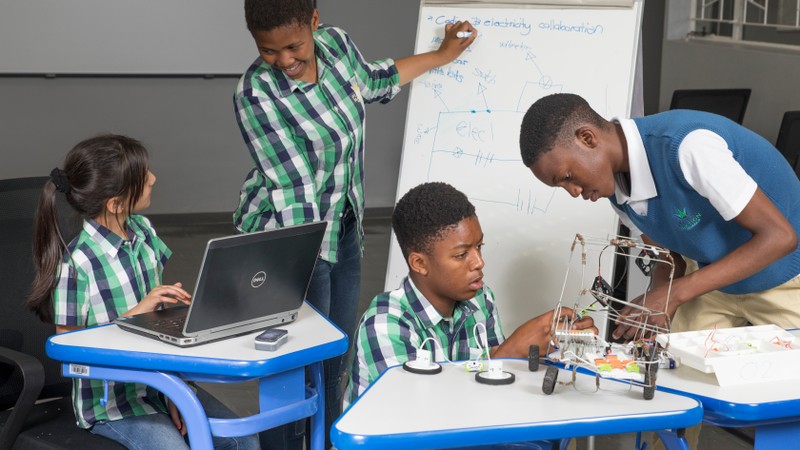Zenzile Nguyuza and Nezeka Makaula - Grade 8 teachers at Future Nation Schools
To achieve success in today’s fast-paced, technology-driven and global economy a number of core skills are required to prepare learners for their future workplace.
While most academic curriculums focus on the core academic subjects, which still remain important, many learners aren’t gaining the skill sets required to seamlessly integrate into the business environment.
For this reason, our 21st century learning approach focuses a lot on project-based learning, where learners are given a specific project with clear outcomes, through which they are guided in terms of the knowledge, hard and soft skills required to complete the task. The projects are linked to real-world scenarios further reinforcing the key concepts being taught.
The project required the students to conduct research, work in teams, collaborate, plan effectively, successfully manage conflict, as well as communicate the outcome of their research in their own words. Skills which are critical in any workplace environment.
The added benefit of project-based learning is that it introduces and enhances a number of inadvertent skills.
In this instance, students learnt basic computer programming skills and gained a deeper understanding of their individual strengths and weaknesses. In the end this project ended up building learner characters as there were many instances where they had to reflect on themselves and their teamwork throughout the duration of the project. This allowed for skills development and personal growth which is just as important.
A successful project-based learning initiative recently completed by Grade 8 learners involved a hydroponic garden. The aim of this project was to grow their own vegetables and thereafter sell them as a way of giving back to the community.
While the Grade 8 curriculum does prescribe the study of photosynthesis, our project-based learning approach allowed us to take it a few steps further in allowing the children to gain an understanding of the plants’ anatomy and explore various ways to plant vegetation despite infertile soil or drought conditions.
The ultimate take-away for the learners is that contrary to mainstream belief, soil is not required for plants to grow. Advanced agricultural techniques allow you to add the necessary minerals and nutrients into a plant's water supply without needing soil for the plant to grow.
This project was particularly relevant considering the many drought-stricken parts of the country as well the severe poverty and lack of access to fresh produce in many local communities.
Following the implementation of the project the children ultimately are equipped with real-world knowledge and skills that goes way beyond learning the theory and fundamental concepts of an academic subject.
In addition to many of the soft skills required in the workplace such as collaboration, creativity, research and knowledge on how to concisely present their findings in a PowerPoint presentation, the learners also obtained first-hand knowledge of 3D structure design and construction and how to use basic power tools and a water pump.
Our role as educators is ultimately to prepare our children for the complex, fast-paced, global economy we currently find ourselves in.
Gone are the days of the uninspired classroom environment. Finding interactive and engaging ways to teach and learn that is the way forward in order to promote creativity, innovation and also instilling confidence in learners. We regard this as critical in securing an optimistic future in the learner’s career prospects and also in the business sector.
Don’t miss the upcoming Open Days at our Future Nation Schools campuses:
21 July 2018 – FNS Fleurhof
18 August 2018 – FNS Lyndhurst
20 October 2018 – FNS Fleurhof
10 November 2018 – FNS Lyndhurst









